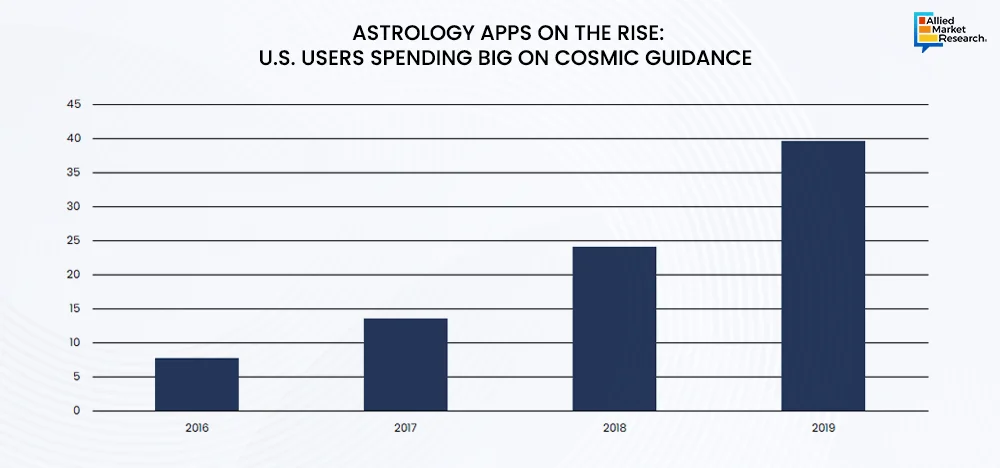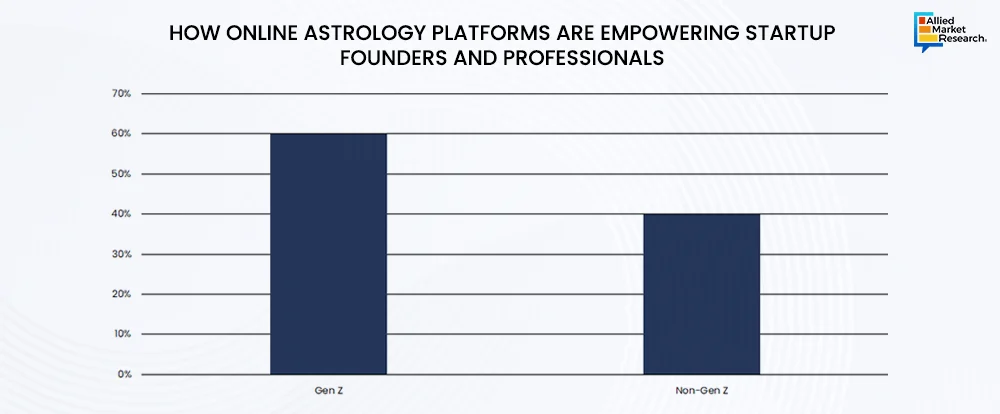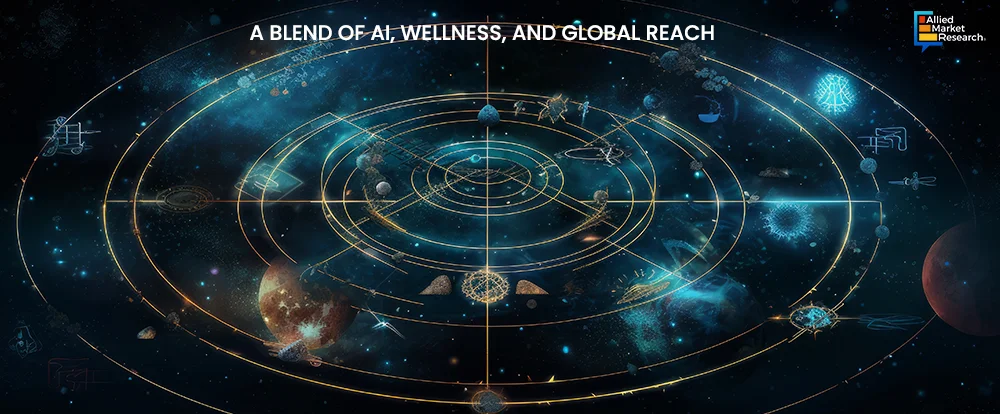Table Of Contents
- Astrology Apps on the Rise: U.S. Users Spending Big on Cosmic Guidance
- How Gen Z is Redefining Astrology for a New Era
- How Online Astrology Platforms are Empowering Startup Founders and Professionals
- Credibility and Regulation in the Astrology Market
- A Blend of AI, Wellness, and Global Reach
- Case Study: Astrotalk's Strategic Growth and Market Impact
- The Crux

Roshan Deshmukh

Koyel Ghosh
Astrology's Digital Revival: Exploring Wellness, Spirituality, and Economic Uncertainty

As people are exploring alternative methods for managing stress and seeking personal insight, astrology has become popular in the growing wellness movement. This interest is driven by the desire for self-improvement and understanding, often coupled with a fascination with ancient practices. The proliferation of astrology apps, websites, and social media platforms has made astrological content more accessible than ever. This digital shift has attracted younger audiences and helped astrologers reach global markets, boosting the industry's growth.
More people, especially younger generations, are embracing alternative spiritual practices as part of mainstream culture. A 2021 Pew Research Center survey found that 29% of U.S. adults don’t identify with any religion, including atheists, agnostics, and those who say their religion is "nothing in particular." This shift away from traditional religion has led many to explore alternative spiritual practices, including astrology. Moreover, the endorsement of astrology by celebrities and influencers has helped legitimize and popularize it, particularly among younger audiences. The Global Wellness Institute reported in 2020 that the wellness economy was valued at $4.4 trillion, with the "personal care, beauty, and anti-aging" sector, which includes spiritual practices, growing by 6.4% annually from 2017 to 2019.
During the 2008 financial crisis, spending on self-help and personal development, including spiritual guidance, increased by about 11.4% from 2007 to 2010 (IBISWorld). Similar trends have been observed during other periods of economic uncertainty, with people seeking guidance and reassurance from astrology and other alternative practices. In a 2020 survey by the American Psychological Association, 78% of U.S. adults reported the pandemic as a significant source of stress, which contributed to a surge in interest in stress-relief and wellness practices, including astrology.
Astrology Apps on the Rise: U.S. Users Spending Big on Cosmic Guidance
Astrology is becoming popular again in the U.S., with more people using astrology apps for personal insights and guidance. This rise in spending is driven by the growing engagement of millennials and Gen Z, who are turning to these platforms more frequently to address both personal and professional challenges.
How Gen Z is Redefining Astrology for a New Era
A recent survey conducted by Astroyogi, a platform for real-time astrological consultation, reveals that the majority of Gen Z—those born between the late 1990s and the early 2010s—are increasingly seeking astrological insights through digital platforms. The survey, which gathered data from 500,000 people over a span of more than six months in 2023, found that 53.8% of Gen Z respondents were turning to astrology, predominantly for guidance on relationships. Notably, Gen Z is four times more likely to seek free consultations from astrologers before committing to paid services compared to millennials and boomers. In cities with high social media usage, Gen Z users accounted for 60.2% of all online astrology users, highlighting their dominance in the digital astrology space. Relationship-related queries dominated, with nearly 80% of Gen Z's questions focusing on current relationships or the potential rekindling of past ones. Aditya Kapoor, Chief Operating Officer of Astroyogi, noted, “Our commitment to providing accurate and insightful astrological guidance in a contemporary format has resonated well with the younger audience.” Additionally, the survey found that 39.8% of Gen Z respondents preferred chatting for astrological consultations, nearly double the number who opted for phone consultations.

How Online Astrology Platforms are Empowering Startup Founders and Professionals
According to an article of Times of India, young professionals and startup founders in India are increasingly seeking guidance from astrologers to focus on the challenges in their careers. This kind of audience is more curious about their future prospects as they openly ask about matters related to salaries, job promotions, career advancement and job switches. Moreover, in 2024, GaneshaSpeaks, an astrology platform, reported a 58% increase in revenue compared to the previous year. It also stated that their astrology platform has a surge in consultation sought by young professionals and entrepreneurs, aged between 23 and 35.
In addition, the COO of Astroyogi, also reported an increase in user base compared to the pre-pandemic. In cities with high social media usage, 60% of online astrology users are from Gen Z, while non-Gen Z users make up the remaining 40%.
Credibility and Regulation in the Astrology Market
The astrology market faces issues with credibility and regulation. As more people, especially younger ones, are becoming interested in astrology, many online platforms and practitioners have emerged. However, the lack of standardized certification or regulation gives way to concerns about the quality and accuracy of these services. This issue is even worsened by the global nature of digital platforms, where different laws and cultural views make it hard to set universal standards. Additionally, skepticism from some people and professionals, especially in scientific fields, is hindering the market growth.

According to a 2023 report from the Ministry of Consumer Affairs in India, a country where astrology is deeply ingrained in the culture, 65% of surveyed individuals expressed concerns about the accuracy and trustworthiness of online astrological services. The report also highlighted that the lack of regulation has led to a 30% increase in consumer complaints related to fraudulent practices in the online astrology sector. Similarly, in the United States, the Federal Trade Commission (FTC) reported a rise in cases of misleading advertising and unverified claims in the wellness and astrology markets.
A Blend of AI, Wellness, and Global Reach
The astrology market is changing rapidly with the help of AI and big data. These technologies are making astrological readings more personalized and accurate by using large amounts of data and advanced algorithms. This means predictions can now be tailored more closely to each person's needs.

Simultaneously, there is a growing demand for niche astrology segments, such as financial astrology, relationship astrology, and career-focused astrology. For instance, financial astrology services have seen a 30% increase in user engagement over the past two years, highlighting the market's potential for diversification and targeted growth. These specialized areas offer tailored insights, appealing to consumers seeking guidance in specific aspects of their lives. This trend highlights the market's potential for diversification and targeted growth.
Astrology is becoming more popular in wellness and mental health services as people focus more on self-care and personal growth. It's now seen as a helpful tool in these areas and is becoming an important part of the mental health and self-improvement markets.
Furthermore, digital platforms are helping astrology services reach more people by removing geographical barriers. With the advancement of technology, astrology is becoming a bigger part of modern life.
Case Study: Astrotalk's Strategic Growth and Market Impact
Astrotalk, an online astrology platform founded in 2017, has emerged as a significant player in India’s astrology market. With a 100% year-on-year revenue growth over the past three years, the company plans to go public by 2025-26, potentially reaching a valuation of over $1 billion. Astrotalk achieved profitability in 2020 and has since expanded rapidly, with over 10,000 astrologers and 30 million app downloads. The company is projected to reach INR 600 crore in revenue by FY24, positioning itself as a market leader in the astrology sector. Moreover, the platform achieved profitability in 2020 and expanded significantly, with over 10,000 astrologers and 30 million app downloads. In FY21, it saw a consistent 10% month-on-month growth, with revenue reaching INR 600 crore by FY24 and a projected EBITDA of INR 100 crore. Positioned for an IPO by 2025-26, Astrotalk is valued at $200 million after raising $20 million in Series A funding from Left Lane Capital.
The Crux
Winding up, the growing popularity of astrology apps among U.S. users highlights a significant shift toward digital platforms for personalized guidance and spiritual insight. This trend is largely driven by millennials and Gen Z, who are increasingly relying on these apps to address life's challenges, particularly in the realms of relationships and career development.
Analysis by Allied Market Research suggests that astrology market players should enhance their credibility and user experience to effectively leverage the growing demand in the industry. They should implement standardized certifications and training programs for astrologers to distinguish legitimate services from fraudulent ones, thus fostering consumer trust. Investing in advanced technology, such as AI-driven insights and personalized content, businesses can attract tech-savvy users like Gen Z. Additionally, expanding into underserved areas like career guidance and mental wellness can provide valuable support through astrology. Emphasizing transparency in pricing and services, while actively incorporating user feedback, professionals can boost customer satisfaction too. Contact our expert specialists to get more details on how partnering with wellness brands and social media influencers can help market players engage a wider audience!

